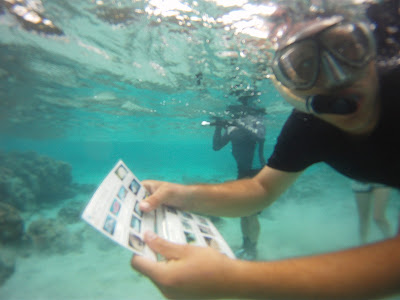Coral reefs are biological treasures of the ocean. More varieties of plants and animals live on coral reefs than in any other ocean habitat. Throughout the ages a vast array of animals and plants have become associated with coral reefs, creating some of our earth’s most fascinating, complex and biologically diverse ecosystems. At least 350 million people and a quarter of all ocean life depend on coral reefs for their food and livelihood.
Corals are coelenterates, a class of animals that also includes sea anemones and jellyfish.They are formed by thousand of tiny polyps grouped in colonies that attach to hard surfaces of the sea floor. Corals are basically carnivorous animals although they do get nourishment from plants, zooxanthellae, with are embedded in their tissues. Corals and zooxanthellae live together in mutually beneficial symbiotic arrangement. Zooxanthellae gains protection, utilize the carbon dioxide produced by corals respiration for their photosynthesis and use other compounds excreted by corals. On the other hand, corals welcome the oxygen produced by zooxanthellae photosynthesis and gain an efficient elimination system that make them save energy for more important things such as reproduction and growth. Corals are generally nocturnal feeders that make them retract their polyps during the day and expand during the night. So, it is only at night that they can be visible in their complete and colorful forms.
However, the health of coral reef ecosystems is threatened by many problems. Despite the seemingly robust nature of many types, all corals are fragile and can be damaged by the gentlest touch. The most serious impact is caused by human touch. Overfishing, known as predatory fishing, and man-made pollution have devastated numerous coral reefs throughout the world - and it is getting worse. Whether this pollution is in the form of chemicals - insecticides, fertilizers, industrial effluents, etc -, siltation, oil spills, or whatever, the result is the same. Not only the pollutants kill the corals directly, they can kill them off indirectly by affecting their food supply. This is very unlikely that man also harvest corals for use as decorations in marine motif restaurants, aquariums and private collections, for instance.
During the last three weeks Katie Thomson from Reef Check Vanuatu (www.reefcheck.org) trained and certified Infinity’s crew for reef check surveys in the Indo-Pacific region. The training included biology, formation of corals and sea life associated with them, survey methodology, identification of substrate categories, fish and invertebrate indicators, predation actions, coral diseases, snorkel and diving survey practices on coral reefs.
Reef Check is an international non-profit organization dedicated to bringing coral reefs back to health and keeping them that way. Reef Check’s core mission is to train teams of volunteers to monitor the status of reefs around the world. The information gathered is used to make sound decisions on how to preserve and wisely manage reefs.
Reef Check Vanuatu is an affiliate of Reef Check International trains volunteers and local communities throughout the islands to monitor their own coral reefs. The data collected goes to support community conservation initiatives and also help inform the national Fisheries Department on trends and threats to coral reefs around the country. Reef Check Vanuatu also works to encourage and support communities in using the traditional form of marine conservation which is done by the chief putting a taboo on the reef.
Our past snorkel and diving trips were just amazing. Beyond a beautiful visual experience, they now help to preserve the fantastic coral reef ecosystem!


